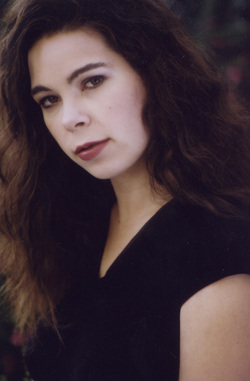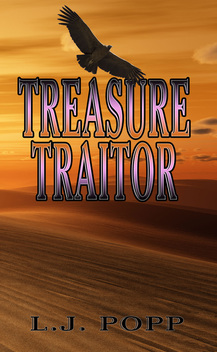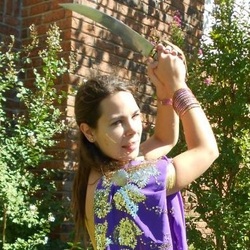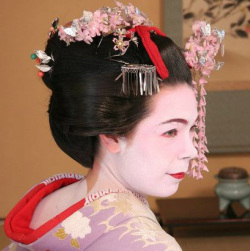
The whole interview process has been great for me as a writer, because it's allowed me to explore other genres and get a better feel for them. Part of the fun also has been getting to know great people like Laura, who has lived just about everywhere and done just about everything, despite having not reached her 30th birthday.
Laura Popp’s novels, short stories, and plays have won numerous local and international awards in the fields of children’s literature and science fiction. In her “normal” life, she has been a model, film maker, teacher, world traveler, and missionary to Japan; India; Malawi, Africa and the U.S. She currently lives in Tulsa, Oklahoma.
You can connect with Laura on her blog, and of course buy her book. Read on for the full interview!

Let’s face it: teens got problems. Adults have problems too, but they’re different. I can’t think of a more confusing or exciting time than being a teenager. (That’s how I define YA, by the way. Anything teens will read.) The world (or the universe, in my book’s case) is wide open. Their career, education, life partner, dreams. In literary terms, this is called a “coming of age,” story, meaning that the main character is trying to find his or her identity or purpose. For fantasy, YA characters are still basically trying to save the world or their little corner of it (or in my book’s case, her best friend who happens to be a telepathically connected bird), but their internal conflicts and their perspective can be vastly different from an adult’s. It’s not uncommon for YA characters to do a complete 180 by the end of the novel in terms of their world-views, loyalties, and goals. That’s not only part of their growth as characters in a story, but as human beings in their world.
As far as whether adult or YA is the more “crowded” field now, many authors are writing cross-over books. These are novels targeted at the YA market but are meant to be appealing to adults as well. Treasure Traitor falls into this category. Also, remember how I said I define YA as anything teens will read? That means you get a lot of YA readers delving into adult literature as well. The lines are blurring, especially in fantasy. Think about Harry Potter, Eragon, and the Hunger Games. These are mass media crazes, originally marketed as YA fantasy. In the end, a good story is just a good story, no matter what label you slap on it.

A lot! It’s actually creepy when I go back and read what I wrote, particularly one of the scenes towards the end of Treasure Traitor. Often I don’t recognize it as I’m writing, but later I’ll say, “Oh, my gosh, he was that guy!” or “Didn’t I say the same thing Rena (the main character) just said when I was sixteen?” Granted, I’ve never been telepathically linked to a vulture or flown in a spaceship, but many of her internal conflicts and the decisions she has to make are similar to ones I had to make. Considering I started writing the book at twenty, I wasn’t that far removed from her age and life-situation, so I guess that makes sense.
In a world crowded with authors releasing through major presses, small presses, and indie publishing, do you think it’s the norm for writers to have a day job – or a back up plan? Is it harder to find a voice, or does the plethora offer inspiration?
Personally, I find the “plethora” a challenge. I think it’s awesome that we live in a day when so many people can have a voice and share their stories. I never consider other authors my “competition.” To me we’re all colleagues, helping to hone one another. As the Bible says, “iron sharpens iron.” I don’t think our goal should be fame and fortune. If any author is in it for that, they might as well quit now. Not that it doesn’t happen for the lucky few. But that should never be our motivation. I believe that the only reason a person should write is because they feel called to write. They have a story bubbling up inside them and if they don’t tell it, they’ll explode!
So on a practical note, let’s say you quit your day job and became a full-time writer. Let’s say you got busy and finished a great short story, edited it, polished it, and sent it out after a week. You might not hear back from anyone for six months. Then they might not publish it for another six months. Then you might not get your pay check for another six months. That’s if the publication doesn’t fold. This is just how the business works. Novelists can do a little better, if they write A LOT of books. So yeah, I think the vast majority of writers at least start off having a job, or they’re retired, or they’re stay-at-home moms. Personally, I work part-time as a teacher/missionary and write full-time. (Honestly, I don’t distinguish much; it’s all a part of my ministry.) It’s a busy schedule, but I’ve never been able to do just one thing anyway.

Well, I’ve had these stories, characters, worlds and cultures all buzzing through my head starting from five years old and have outlined over fifty novels and screenplays, several graphic novels, two musicals, and even an opera! I’d like to eventually have my own TV series based on the Hierarchy/Kingdom universe. I’m working to make all this happen, but honestly, if God wants it to happen, it’ll happen. If not, oh well. At least I had fun dreaming it all up and writing it!
You say that your books are about the story first, and metaphor second. Is it ever hard to “fit” inside someone else’s definition of what a “Christian book” ought to be?
Definitely! I had a hard time finding a publisher for Treasure Traitor for that very reason. I got 32 rejections of this book alone. That’s not including the seven books I wrote before it! The publisher I have sort of fell in my lap. I submitted the manuscript to a Christian agency, the agent turned me down because he thought the Christian elements weren’t strong enough, but his assistant loved it so much that when she became an editor at Written World Communications, she pitched the book to the publisher, who loved it too. So I got a random email from someone I’d never submitted to saying they wanted a three-book deal! It was really a God thing, especially since I’d given up on Treasure Traitor and moved on to other projects.
There was some fussing about a short intimate scene toward the middle of the book. (I think this was one reason other Christian houses turned Treasure Traitor down). In the end, the publisher and my editor supported my choice to include it. They agreed that Christians should stop pretending that the problem of teens giving their hearts away too quickly doesn’t exist, and address it openly and honestly.
Written World actually decided to market the book as mainstream YA fantasy, and I agree with their choice. It isn’t Christian fiction in the genre sense (it doesn’t follow the formula), but the connections/metaphors are there for those who want to find them. My goal was to appeal to an audience that doesn’t normally read Christian fiction.

I have to start by admitting that when I go on vacation, I don’t write! Well, I journal, and I take a lot of pictures, and my travels always end up in my books somehow. I often travel between projects, to clear my head and start fresh. To me a “writer’s vacation” is a conference in another state or country, which I often do. But if I were to take the “ideal writer’s vacation,” it would probably be to the writer’s colony in Eureka Springs, Arkansas. I love Eureka Springs and I’ve always wanted to do that!
On a similar note, the best place I ever lived as a writer was Japan. It felt like dwelling on another planet, so as a science fiction author, it was perfect! Constant inspiration.
What’s been your favorite part of the publishing process so far?
my publisher is Starsongs, the fantasy imprint of Written World Communications. But my favorite part of the process has probably been designing the cover. I have the most AMAZING artist who listened to all my input and came up with the best cover EVER, right down to the title font. That was something that had me concerned, since most publishers don’t give authors a say. It was really exciting to be part of the process and a relief to see it turn out so well. I actually outlined it on my website in “Story of a Book Cover.” The artist is also doing a book trailer for me, which I’m sure will be just as AWESOME!
The other thing is all the ideas my publisher has had along the way that I wouldn’t have even thought of. A Treasure Traitor play list? How cool is that!
Is there anything else you’d like to tell us about yourself and/or your work?
Lots of people tell me, “I’d love to buy your book, but I just can’t afford it.” To which I say, “Well, you can get the ebook version which is only $2.99.” Then they give me this very sad look that says, “If I can’t spend $12.99 for a paperback, what makes you think I can afford an ebook reader?” I’ve got great news for you. It’s the best kept trick in the literary world. Shh, you can’t tell anyone. Ready for it? Go onto your local library website or call them and request a copy. Libraries have a budget for that, but since they get so few requests, they order nearly all the books requested, especially if two or more people ask for it! Even if you DO buy Treasure Traitor, if you like it, go ahead and call up your library so others can benefit. If I had a book in every library in North America, that’s over 200,000 books, and almost anybody could read Treasure Traitor. Pretty neat, huh?
Besides book two in the Treasure Traitor series, An Honest Assassin, I’m working on two other series right now, Dargon the Human Slayer (a secular middle grade fantasy trilogy) and Children of Light (an adult straight-up Christian fantasy).
Mostly I just write for the glory of God. If He tells me to stop, I will, but until then I’ll keep penning my best work!

 RSS Feed
RSS Feed